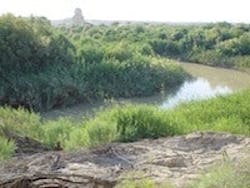Officials from Jordan River Valley, Great Lakes Region Sign Sister Waters Agreement
Mayors and city officials from across the Great Lakes and the Jordan River Valley signed an agreement this month linking their communities through a “Sister Waters” partnership.
In October 2014, Sister Cities Intl., EcoPeace Middle East and Citizen Diplomacy Initiatives signed a Memorandum of Understanding to connect Israeli, Palestinian and Jordanian communities with U.S. cities to create multilateral sister city relationships. The initiative aims to bring together youth, adults and municipal representatives from all four communities to cooperate on water resources management and sustainable development.
Building on that initiative, the “Sister Waters Agreement” signing took place at Water after Borders: Global Stakes, Local Politics, a two-day summit at the University of Illinois at Chicago (UIC), April 23 to 24, 2015. Water after Borders focused on strategies for sharing water across political, geographical, and cultural boundaries.
Palestinian Mayor Hassan Jirmi; Jordanian Mayor Khalifah Suliman Mohammad Aldayyat; Israeli representative Ran Molho convened with Mayor John Dickert of Racine, Wis.; Mayor Mitch Twolan of Huron-Kinloss, Ontario, Canada; and Mayor Denis Lapointe of Salaberry-de-Valleyfield, Quebec, Canada to sign the Sister Waters Agreement at the summit.
Under the new relationship, EcoPeace Middle East and Great Lakes and St. Lawrence Cities Initiative will “facilitate technological, business, educational, capacity-building and community exchanges through sister city and sister water relationships, including workshops, site visits, and opportunities for technical experts, municipal administrators, business leaders, and youth delegations.”
“This is another example of subnational officials and organizations taking the lead in addressing international issues affect their communities,” said Adam Kaplan, vice president, who signed the agreement on behalf of Sister Cities Intl. “Problems related to access to water and water management are felt acutely at the local level, but can only be solved through international cooperation. Despite the fact that national governments control borders, these communities have shown that progress on these problems can be made through citizen diplomacy and local cooperation.”
The partnerships will be facilitated by EcoPeace Middle East, an Israeli/Jordanian/Palestinian trilateral organization dedicated to environmental peacebuilding, and the Great Lakes and St. Lawrence (GLSL) Cities Initiative, a coalition aimed at protecting and restoring the Great Lakes and St. Lawrence River. The two organizations have partnered to develop cooperative relations between mayors from each region (U.S., Canadian, Palestinian, Israeli and Jordanian) over issues pertaining to trans-boundary water sources.
“The agreement will enable mayors in a war torn region to adapt long-standing models of water sharing from the abundant Great Lakes region,” said Rachel Havrelock, associate professor of English at UIC, a founder of Freshwater Lab, a think-tank on water issues at UIC, and an organizer of the conference.
Mayors from the Lower Jordan Valley who attended the conference represented partnering communities in EcoPeace Middle East’s “Good Water Neighbors” Program, a unique project launched 14 years ago to develop cross-border cooperation over shared water issues and peaceful relations between neighboring communities in the conflict-ridden Levant.
American and Canadian mayors attending the conference represented Great Lakes/St. Lawrence cities that are part of the GLSL Cities Initiative. The Great Lakes and St. Lawrence Cities Initiative is a binational coalition of U.S. and Canadian mayors and other local officials working to advance the protection and restoration of the Great Lakes and St. Lawrence River. By integrating their environmental, economic and social agendas, local governments are helping to protect and restore a resource that represents approximately 20% of the world’s surface freshwater supply, provides drinking water for 40 million people, and is the foundation upon which a strong regional economy is based.
Through their partnership, EcoPeace Middle East and GLSL Cities will foster knowledge exchanges over technical, economic, educational, capacity-building, and communal aspects of water management and protection, and advance peaceful relations and stability between communities that share water resources.
Source: Sister Cities Intl.
